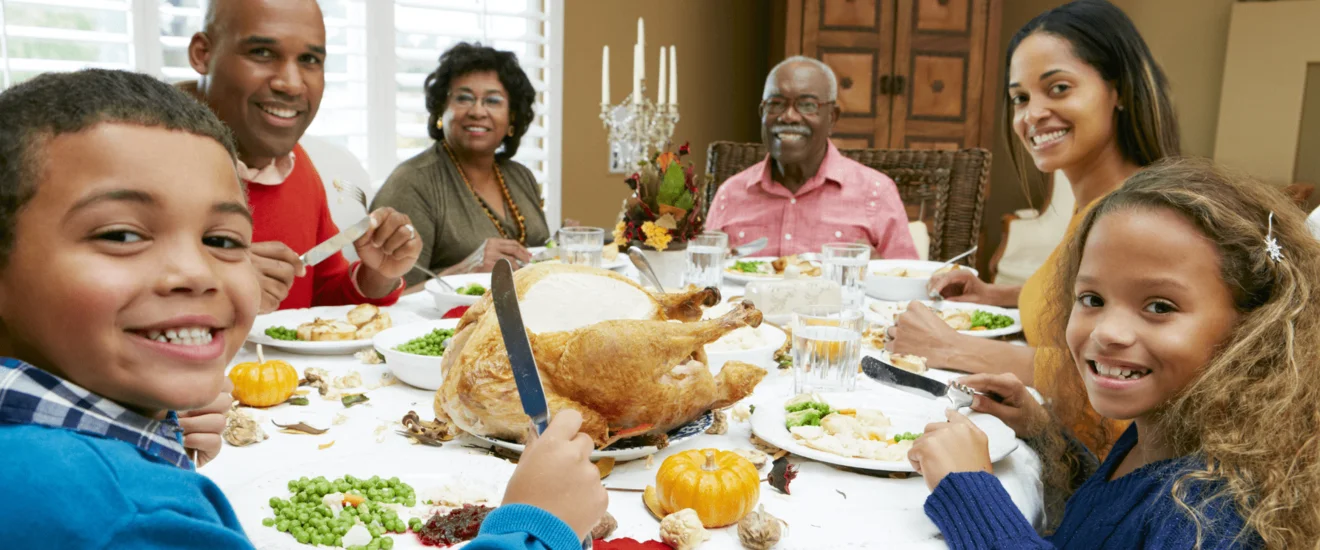The holiday season is a time for family and friends. A time to get together with loved ones, make new memories, and eat lots of delicious food. But, if you have a child with autism, this time of year can bring along some extra stress.
Family gatherings can sometimes be overwhelming for children on the autism spectrum. The decorations, bright lights, different smells, and new people, can potentially be dysregulating. However, with a little preparation and planning, you can host an accessible autism-friendly family gathering this holiday season.
Talk to Your Family in Advance
One of the best things you can do to make your holiday family gatherings more accessible is to educate your family about your child’s autism. Aunts, uncles, grandparents, and cousins, they don’t live with your child and may not fully understand autism and your child’s specific needs, interests, and sensitivities.
Is your child sensitive to noise or do they fixate on certain decorations? Maybe your child doesn’t like hugs.
Think about what your family may encounter or need to know about and communicate it with them in advance. Also, be sure to give them the opportunity to ask any questions they may have.
And don’t forget children. If there will be other children at the gathering, make sure to properly explain autism in a child-friendly way to them too.
Practice with Your Child
Many holiday activities or traditions may be new to your child. Whether it is taking turns opening gifts, sharing things you are thankful for around the dinner table, or something else, take some time leading up to the event to practice these things with your child.
Social stories and other visual learning tools are great ways to teach your child about holiday traditions and activities. You can also read books and watch movies with them. And if you can, role-playing is a great opportunity for your child to practice these activities before the big day!
Create a Safe Space
The holidays can be loud and crowded, filled with lots of new sights, sounds, and smells. Be sure to create a safe place for your child to escape to whenever they need a break or begin to feel overwhelmed.
This safe space can be a bedroom or corner of a room, whatever is available and makes sense for your child’s needs. Make sure your child knows where this space is. Leave comforting and regulating items in this area so they are easily accessible to your child.
Be Mindful of Noise & Decorations
With bright lights, lots of decorations, and holiday music, the holidays can easily be a sensory overload for a child on the autism spectrum. Having people over, especially a large group, can increase the amount of new sensory input.
If your child is easily overstimulated try to limit the decorations, lights, music, and scented candles around your home during the holidays.
To limit the chances of your child getting overwhelmed you may want to consider decorating your home gradually and letting your child help. This can turn decorating into a fun activity for your child. And by decorating gradually, your child will have the opportunity to slowly adjust to the changes in the home’s decor. Their participation can also help you gauge when enough is enough. Some children like lots of decorations, while others may not.
Provide a Variety of Food Options
The holiday season is often filled with a lot of delicious foods, that many of us do not eat on a regular basis. Things like roast turkey, cranberry sauce, pumpkin pie, and so much more are common holiday staples, but your child may not be familiar with them.
Get your child involved in planning the holiday menu. This may make them more interested in trying new foods and will give them an idea of what to expect. You’ll want to make sure that you include a variety of safe foods for your child and be sure to have snacks you know they like on hand.
As a bonus, if you can, test-run some of the new holiday dishes with your child before the big day. They may discover they really love something unexpected.
Entertainment & Activities
Holiday family gatherings are a great time to catch up, reminisce, and make new memories with loved ones, but for kids, the night can drag on. Help your child fend off boredom by making sure they have a variety of entertaining activities to choose from.
If there will be a lot of kids, think about putting on holiday movies and having things like coloring books and toys to share out for them. Do the children in your family enjoy video games? Consider designating a room as the “game room.”
Keep Things Comfortable
There is already a lot going on, with all the family members, new foods, and new decorations, so having your child dress in uncomfortable “fancy” clothes isn’t always necessary. Consider making your holiday family gatherings casual. Allow people to come in clothes that they are most comfortable in or possibly take it a step further and make your family gathering holiday pajama themed.
If visiting family during the holidays
It’s easier to control the holiday gatherings when you are the host, but what if you need to travel this holiday season?
Here are some things you can do to help make sure your family’s holiday gatherings are accessible for your child with autism (even when you’re not in charge):
- Discuss your child’s needs with the host. Explain any sensitivities or triggers your child may have.
- If your child has never been to this relative’s home, or place where the gathering is happening, ask for photos in advance. This can help your child prepare for what the place will look like and what to expect. If there will be new people there as well, sharing photos of them too can be very helpful.
- Ask the host about designating a safe space or quiet spot for your child to escape to when they need a break. This could be a bedroom or even the corner of a room. Make sure your child knows where to go and supply the space with comforting items like noise-canceling headphones, weighted blankets, fidget toys, and anything else your child may need.
- If your child is easily overstimulated, ask the host about their decorations. Possibly suggest that they don’t play holiday music in the background or request that they keep it at a lower volume.
- Ask about the menu in advance and possibly volunteer to bring a dish or two that you know your child will enjoy. Also, be sure to pack a variety of snacks.
- Don’t be afraid to skip an event or leave early if your child is uncomfortable. Not all hosts will be able to accommodate your child’s needs and even with the best effort they may still become dysregulated.
For more holiday tips be sure to check out the Opya Blog!






